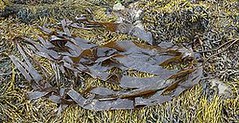 威爾斯的科學家在7月4日的一場科學會議中說,沖上威爾斯海岸上的大片海藻可能是未來極具潛力的生質燃料,尤其是在夏天進行採收。
威爾斯的科學家在7月4日的一場科學會議中說,沖上威爾斯海岸上的大片海藻可能是未來極具潛力的生質燃料,尤其是在夏天進行採收。
科學家在實驗生物學會年會(Society for Experimental Biology Annual Conference)中,對與會者表示,掌狀昆布(Laminaria digitata)可能成為以陸上植物提煉生質燃料的重要替代品,不過隨著季節的不同,適合的化學成分組成也會變化。
他們的研究顯示,昆布的碳水化合物含量在7月份達到最高,這個時候採集可以確保昆布有最多的糖分,以用作生產生質燃料。
微生物與發酵科學家Adams博士說,金屬會抑制發酵的過程,所以昆布中的金屬濃度要越低越好。
他們的研究結果發表在7月4日的實驗生物學會年會上,最適合收成生質燃料的季節是7月,這個時候的昆布有最高比例的碳水化合物與最低的金屬含量。
昆布可以由不同的方式轉化成生質燃料,例如經由發酵或是無氧消化產生乙醇或甲烷,或者經由熱解(一種無氧的加熱法),來產生生物油。
過去的有關生質燃料的研究都集中在陸上植物,但這樣會產生土地使用的衝突:要種植糧食還是生產燃料?
 海洋生態系是一個未開發的資源,生物量超過全球的50%,Adams博士說,海藻每平方公尺的生產量比陸上快速生長的植物,例如甘蔗,還要更高。
海洋生態系是一個未開發的資源,生物量超過全球的50%,Adams博士說,海藻每平方公尺的生產量比陸上快速生長的植物,例如甘蔗,還要更高。
海藻在未來的能源生產上扮演重要的角色,Adams博士說,「生質燃料與其他像是風力等可再生能源最大的不同在於風力無法儲存,我們可以在風力下降的時候使用生質能源。」
未來的工作將是改善萃取的過程,在使用海藻生產生質燃料以前,先辨識並萃取出色素以及酚類等高價值的物質。
海藻的研究是亞伯里斯特威斯大學新提倡計畫的一部分,以促進威爾斯的經濟活動,並且在對抗氣候變遷上作出貢獻。
燈塔計畫(Beacon for Wales)旨在開發新技術與新方法以取代傳統上用石油製作產品。目標是將威爾斯建立成為優秀的生質能提煉中心。
威爾斯第一副部長Ieuan Wyn Jones曾在2月時宣布,將由歐洲區域發展基金投入1050萬英鎊資金在這項計畫,計畫總預算預計為2000萬英鎊。
研究內容將涉及「生質能提煉-開發」一種複雜的程序,以將當地種植的作物轉變成具有價值的化學物以及商品,從燃料到化妝品、藥物、紡織品、食品以及保健產品。
Seaweed that washes up in great piles along the coast of Wales may yield a viable future biofuel, especially if harvested in summer, Welsh scientists revealed at a scientific conference in Glasgow on Monday.
The use of a kelp known as Laminaria digitata could provide an important alternative to biofuels grown on land, but the suitability of its chemical composition varies on a seasonal basis, the scientists told colleagues at the Society for Experimental Biology Annual Conference.
Harvesting the kelp in July when carbohydrate levels in the kelp are at their highest would ensure optimal sugar release for biofuel production, their study shows.
Dr. Adams, a microbiologist and fermentation scientist, says metals can inhibit the fermentation process so metal concentrations in kelp should be kept low.
Their results, presented at the Society for Experimental Biology Annual Conference on July 4, showed that the best month for biofuel harvest is in July when the kelp contains the highest proportions of carbohydrate and the lowest metal content.
Kelp can be converted to biofuels in different ways such as fermentation or anaerobic digestion producing ethanol and methane, or by pyrolysis, a method of heating the fuel without oxygen, which produces bio-oil.
Past research into biofuels has focused on terrestrial plants; however, these have the drawback of the conflict between using land to grow food or fuel.
Marine ecosystems are an untapped resource that account for over 50 percent of global biomass, and Dr. Adams says seaweeds are capable of producing more biomass per square meter than fast-growing terrestrial plants such as sugar cane.
"Seaweed biofuel could be very important in future energy production," says Dr. Adams. "What biofuels provide that other renewables such as wind power cannot is a storable energy source that we can use when the wind drops."
Future work will improve the viability of the process by identifying and extracting high value substances, such as pigments and phenols, before the rest of the seaweed is used to produce biofuel.
The seaweed research is part of a new initiative at Aberystwyth University that could boost the green economy in Wales and make a contribution to combating climate change.
The BEACON program aims to develop new technologies and new ways of making products that are traditionally made from oil. The goal is to establish Wales as a bio-refining center of excellence.
Deputy First Minister for Wales Ieuan Wyn Jones in February announced £10.5 million of funding for the program from the European Regional Development Fund. The total budget for the initiative is expected to be £20 million.
The research involves bio-refining - developing sophisticated processes to turn locally grown crops into valuable chemicals and commercial products, from fuels to cosmetics, pharmaceuticals, textiles, food and health products.
全文及圖片詳見:ENS報導






